Popular Articles
- Listol Supplement Facts
- Natural Alternatives to Adderall
- Listol Interactions
- Helpful ADHD Vitamins & Attention Vitamins
- Cyntol Supplement Facts
- Memory Enhancement Supplements - Natural and Herbal Enhancers Reviewed
- ADHD Herbs - Guarana and Other Herbal Supplements
- ADHD Product Review - Synaptol
- Short-Term Memory | Supplements for Improvement
- Pills for Memory
- More Articles ...
 9 ADHD Products ReviewedIn This Article
9 ADHD products reviewed - True Focus, Adderplex, Focusene, Synaptol, and more.
You'll often hear excuses of "kids will be kids" or "they're just overexcited," or "the child just lacks discipline." But parents of hyperactive, inattentive kids know that there is something more going on. Kids with ADHD are not acting out of the wrong intention, but they are biochemically out of balance, and parents need to identify this behavior change. Even though researchers believe ADHD has existed for over 100 years, it was only in the 20th century that scientists began researching into this behavior when Dr. George Still met several young children who were having "defective moral control." Fortunately, today there are several medications and remedies available to treat ADHD and ADD. Whether you are an adult with ADD or a child with ADHD, or a child struggling with a learning disorder, take a few minutes to examine the ins and outs of ADHD and how you can treat the condition and regain control of your life. The Symptoms of ADHDADHD has three main forms. While hyperactive ADHD is most commonly recognized, two other forms of ADHD are easier to miss. Learning to recognize the signs of ADHD in yourself and others can go a long way toward finding the right treatment and behavior therapies that can help individuals with ADHD. An undiagnosed person with ADHD may feel like she/he is not as good as others because it is harder to focus, pay attention, keep things organized, and stay on task. Left undiagnosed, there is no reason for the struggle, and the child or adult with ADHD is left thinking they are always wrong, which can cause problems in personal and professional relationships as well as lead to low self-esteem. Types of ADHDThe symptoms of ADHD vary by type. A brief outline of the most common symptoms are outlined below: Inattentive ADHDThis form of ADHD is often called ADD because symptoms of hyperactivity are less obvious. Still, it is officially included under the ADHD umbrella. Symptoms can include:
HyperactiveThe hyperactive type of ADHD is the easiest to spot and diagnose. Some research has suggested that since boys present with hyperactivity ADHD more often than girls, they are diagnosed more readily than girls, even though girls are just as likely to have ADHD. Symptoms of hyperactive ADHD include:
ImpulsiveImpulsivity is a symptom of most cases of ADHD. However, there is a form of ADHD that is more impulsive than distracted or hyperactive. Symptoms can include:
Combined TypeSome children (if not most) will show signs of all three types of ADHD. However, symptoms from all three areas do not have to be present to be diagnosed with ADHD. Symptoms do have to be present in multiple settings to qualify for an official diagnosis, including at home, school, and social activities. The Causes of ADHDWhenever there is an abnormal health condition or learning disability, most parents want to know the cause of the condition. However, in most cases, the cause of ADHD is simple genetics. Still, some research has indicated that a few other issues may trigger or worsen ADHD symptoms. How ADHD Works ADHD is not a discipline problem. Current research indicates that ADHD is not caused by laziness, lack of motivation, selfishness, or any other negative cause. ADHD is considered a medical disorder that affects how the brain functions. Research has shown that ADHD affects several main areas of the brain responsible for regulating behavior. At its root, ADHD is an executive function disorder. Executive function controls areas of the brain including
Over the years, researchers have debated on if there is a true "cause" of ADHD. The most recent research is outlined below: Heredity and ADHDIf you or your kids have ADHD, genetics is the most likely cause. Family studies, twin studies, and adoption studies have all suggested that if one person in a family has ADHD, other family members have an increased chance of also being diagnosed. 25 percent of family members of individuals with diagnosed ADHD also have ADHD. In families without any diagnosed ADHD, the risk of diagnosis was only 5 percent. Your chances of having ADHD are five times higher if someone else in your family has it. 82 percent of identical twins were diagnosed with ADHD if their twin was also diagnosed. Genetic researchers have looked into the possibility of a gene causing ADHD. Dopamine genes have been identified as possibly relating to the disorder. DAT1 and DRD4 are associated with the condition. As of yet, nothing has been proven, but researchers believe it may soon be possible to identify an ADHD gene. Toxic Exposure and ADHDStudies have found that exposure to tobacco and alcohol during pregnancy is more likely to cause learning disabilities and ADHD in children. Lead exposure also increases the risk of developing behavior and neurological disorders. Brain Trauma and ADHD It was thought for some years that brain trauma might trigger ADHD, just like it can for cerebral palsy. But research has found that, while possible, brain trauma is not the most likely cause of ADHD or other learning disabilities. What Does Not Cause ADHDThe following "causes" of ADHD have been debunked: Vestibular SystemResearchers hypothesized that trouble in the vestibular system may cause ADHD. It was suggested that taking anti-motion sickness medicine could alleviate ADHD symptoms. This has been proven to be false. Screen TimeHow much screen time a child gets does not affect whether they have ADHD. A child with ADHD usually gets no more screen time than a child without ADHD. Treatment Options For ADHDThere are many treatment options for kids with ADHD. While some parents chose to medicate children with ADHD, not all parents are happy with that idea and seek a natural treatment route. Studies show that a combination of medication and behavior therapy is the best combo for treating ADHD symptoms and helping children with ADHD live a normal life. Many families of children with ADHD use a combination of medications or supplements, family therapy, behavior therapy, and social skills training. Mind/body techniques, like biofeedback, may also be effective in reducing some of the symptoms of ADHD. Children and adults with ADHD may benefit from the following treatment options: Drug TherapiesMany cases of ADHD are treated with drug therapies (usually stimulant medications). Research suggests that stimulant medication can boost how much dopamine and serotonin are in the brain, which help regulate the mood, control impulses, and facilitate concentration. The most common medications used for ADHD include: Methylphenidate (Ritalin or Concerta): This stimulant is the most commonly used in children with ADHD and is effective in about 75 percent of children and adults with ADHD. Children under 6 should not use this form of medication. Dextroamphetamine (Dexedrine): This is another stimulant medication that works slightly different from Ritalin. Its effective rating is about 70 percent and it is not recommended for children under age three. Most children younger than five are not diagnosed with ADHD due to the difficulties identifying the condition at such a young age. Amphetamine/Dextroamphetamine (Adderall): Adderall is a popular ADHD medication that is now a problem in high school and college campuses. Adderall is designed to help children with ADHD focus clearly on one subject, but some children who do not have ADHD take Adderall under the table to boost test performance. Adderall has about a 70 percent effectiveness rating and can be habit-forming. Lisdexamfetamine dimesylate (Vyvanse): Vyvanse is a type of simulant salt medication like Adderall, but slightly weaker and less habit-forming. Some parents start with Vyvanse and move on to Adderall if the medication does not work. Vyvanse has about a 70 percent effectiveness rating. Atomoxetine (Strattera): Strattera is the first non-stimulant medication that is FDA approved for ADHD. Strattera increases how much norepinephrine and dopamine in the brain. Strattera works similarly to an antidepressant to help the neurotransmitters in the brain process nerve impulses correctly. Strattera may cause suicidal thoughts. Antihypertensives (clonidine and guanfacine): These two medications are not approved for ADHD by the FDA. Still, some doctors prescribe them to ADHD patients. The medications work to counteract tics and insomnia often caused by ADHD medication. Behavior TherapyOften, a family will not know how to face the difficulties of ADHD alone. Studies show that a multi-tiered approach to ADHD therapy is the most effective in providing life-long results. In addition to medication or natural diet or supplement changes, parents should consider behavior therapy for their entire family and the child with ADHD. The therapist can help the person with ADHD learn coping mechanisms to help prevent meltdowns, facilitate concentration, and improve their quality of life. Common Side Effects of ADHD MedicationThe biggest danger of long-term use of ADHD medication is that it can be habit-forming. If a person with ADHD cannot focus without the medication, then they are at a severe disadvantage when they must work without medication. The person with ADHD may never work out how to use coping mechanisms to control their ADHD symptoms, which could leave the person at a disadvantage in the workplace and school. Additionally, ADHD medication also carries some risk. For example, non-stimulant ADHD medication carries the risk of increased suicidal thoughts. Stimulant medication can cause symptoms such as:
Alternative ADHD TherapiesA large portion of ADHD parents will supplement medication and behavior therapies with natural treatments for ADHD. Some parents chose to not medicate at all, but instead, use behavior and supplement treatments only. Some evidence suggests that children with ADHD are often low in certain vital nutrients, although the exact link for this is unknown. Some studies have shown that improving the diet can help a child learn to focus and control their behavior without the need for medication. The following natural treatment options are the most common for ADHD: Lifestyle Therapies for ADHDADHD isn't so much a brain disability as a brain difference. A parent (or spouse) can help a person with ADHD by making a few lifestyle changes. Many therapists specialize in working with kids and adults with ADHD and can help offer lifestyle coping mechanisms both for the person with ADHD and their family to prevent conflict and help the person with ADHD live normally. A few commonly-implemented behavior therapies for the home include:
Listol is a natural supplement manufactured by Progressivehealth.com used as a natural aid for reducing the symptoms of ADHD in adults. The ingredients in Listol are designed to restore the right balance of nutrients in the body, reduce impulsive behavior, and improve mental focus. The natural ingredients in Listol aid to restore the levels of nutrients in the body, increase mental focus, consistency, and reduce impulsiveness.
|
| True Focus |
|
Ingredients: True Focus contains vitamin C, potassium, vitamin B6, l-tyrosine, taurine, grape seed extract, potassium, DMAE, ginkgo biloba, l-phenylalanine, and coQ10. |
|
Effectiveness: The reviews on True Focus are mixed. Some individuals report positive results, while others say the formula does not work at all. Of those who claim effectiveness, the formula is credited with reducing racing thoughts and helping the person to focus. The biggest complaint with this formula is that it either doesn't work at all or causes drowsiness. |
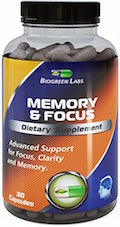 Potent Mind and Memory
Potent Mind and Memory
Potent Mind and Memory is a focusing/ADHD supplement manufactured by Biogreen Labs. The formula is designed to boost brain function, mental clarity, and focus. The formula is based on ancient remedies for memory and is influenced by Chinese and Indian medicine techniques. The mixture contains no vitamins, but a blend of amino acids and herbs.
| Potent Mind and Memory |
|
Ingredients: L-glutamine, ginkgo biloba, phosphatidylserine, DMAE, huperzine-A, vinpocetine, St. John's wort, bacopa monniera, and N-acetyl-l carnitine. |
|
Effectiveness: Users report largely positive effects. Most users report improvements in thinking ability, mental clarity, and the ability to memorize easier. Only a few users report negative side effects or ineffectiveness of the product. |
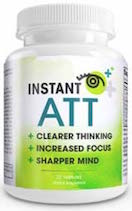 Instant ATT
Instant ATT
Instant ATT is a brand of natural supplements designed to improve focus and reduce some of the common side effects of adult ADHD. Instant ATT is manufactured by a company with the same name. The company claims that Instant ATT can improve memory, make focusing easier, and help with memorization and study time.
| Instant ATT |
|
Ingredients: St. John's wort, ginkgo biloba, phosphatidylserine, bacopa monniera, vinpocetine, DMAE, huperzine-A, and N-acetyl-L carnitine. |
|
Effectiveness: Instant ATT has mixed reviews. Some users report better focus and attention after taking this product, but many other users report no effects. Some common side effects reported are mild headaches, mood swings, and lethargy. Some reviewers state that the product is effective and helps both focus and attention. |
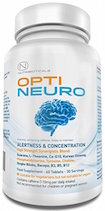 OptiNeuro
OptiNeuro
OptiNeuro is manufactured by a company with the same name. As the name claims, the product includes natural herbs and vitamins designed to boost mental performance and clear the mind of brain fog. The company claims the mixture will help improve brain performance, reduce brain fog, increase focus, and protect the memory.
| OptiNeuro |
|
Ingredients: Guarana, l-theanine, acetyl-l-carnitine, choline, bacopa, l-alpha-glyceryl phosphorylcholine, acetyl-l-tyrosine, trimethylglycine, phosphatidylcholine, vitamin B3, piperine, coenzyme Q10, vitamin B12, vitamin B5. |
|
Effectiveness: Overall, most users report positive results from taking OptiNeuro. The blend of vitamins and amino acids could be what makes it more effective than simple herbal formulas. Reviewers who do report negative side effects state that it does not work for everyone and that side effects like a headache and mild nausea are common. |
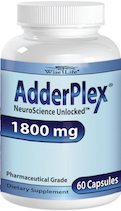 Adderplex
Adderplex
Afferplex is a supplement designed to boost memory and focus. The manufacturer claims that users will have better memory and focusing power similar to those provided by traditional ADHD medications.
| Adderplex |
|
Ingredients: L-glutamine, ginkgo biloba, phosphatidylserine, DMAE, vinpocetine, St. John's wort, and bacopa. |
|
Effectiveness: Individuals who have tried Adderplex report either loving it or hating it. For some people, it seems that this formula is effective at controlling impulsive behavior, focusing the mind, and boosting memory performance. But for other users, the formula is not effective at all. Negative reviewers state that the product does not work for them or may cause drowsiness. The blend of vitamins, herbs, and amino acids make this almost a replacement for a daily vitamin. |
 Added Attention
Added Attention
Added Attention is a liquid ADHD supplement manufactured by Buried Treasure. The formula is designed to increase focus, prevent attention lapses, improve memory, and boost the mood. The manufacturers state that Added Attention can be given to children or adults.
| Added Attention |
|
Ingredients: Sugar, vitamin B1, vitamin B2, vitamin B3, vitamin B6, phosphatidylserine, phosphatidylinositol, phosphatidylcholine, endomembrane, chromium, phosphatidylinositol, omega-3, grapeseed extract, lemon balm, gotu kola, chamomile, GABA, and DMAE. |
|
Effectiveness: Just like many of the other ADHD supplements on this list, users report mixed reviews. Some reviewers stated they noticed a difference in attention, concentration, focus, and behavior after taking Added Attention. Other reviewers claim the product causes hyperactivity or has no effect at all. Hyperactivity may be caused by the inclusion of sugar. |
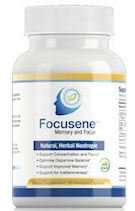 Focusene
Focusene
Focusene is a blend of herbs and vitamins designed to counteract the side effects of ADHD. The manufacturers claim that Focusene can help make tasks easier, improve focus, reduce distractions, and boost mood.
| Focusene |
|
Ingredients: Vitamin B6, DMAE, forskolin, l-phenylalanine, acetyl-l carnitine, and l-theanine. |
|
Effectiveness: Most users report positive effects after using Focusene. Reviewers state that it can provide minor boosts to focus and attention. Most users caution that it is not a magic pill, however, and cannot take the place of prescribed medication. Users may not find the boost in focus is strong enough to continue usage. Some users report the benefits are placebo and may do nothing to improve mental performance. |
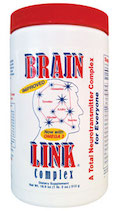 Brain Link
Brain Link
Brain Link, manufactured by Pain and Stress Center, is an amino acid formula designed to boost brain performance, memory, and attention. The manufacturer claims that Brain Link contains all of the amino acids your brain needs to communicate more effectively and provide benefits for clarity and focus.
| Brain Link |
|
Ingredients: Brain Link contains a huge variety of vitamins and amino acids including all of the major vitamins like A, D, B, and C vitamins. Brain Link also contains tons of minerals, including calcium, magnesium, and iron. Additionally, Brain Link contains several other amino acids. Most of the included vitamins provide at least half or more of the daily recommended intake of that nutrient. |
|
Effectiveness: There are few reviews of Brain Link currently active, but most are positive. Customers report feeling more energized, having better memory, and improved focus after taking the formula for a few weeks. The few negative reviews state that the formula does not affect attention or concentration. |
Other Supplement Formulas to Consider
Learning Factors
Developed by Natural Factors, it is known to help children with attention disorders. It contains essential fatty acid (EFA), evening primrose oil (GLA), thyme oil, vitamin E, and dolphin-friendly tuna oil (EPA and DHA). Learning Factors is a product line of natural ADHD medications. The most popular is Learning Factors: School Aid.
These formulations are mixtures of essential fatty acids including EPA or Eicosapentaenoic acid, DHA or Docosahexaenoic acid, AA or Arachidonic acid, and GLA or Gamma Linolenic acid. These fatty acids have been proven to promote brain and eye health. Of these fatty acids, DHA is the most prominent since it is the one found in the highest proportion in the structures of the brain and eyes. Generally, the fatty acids prevent oxidative damage to the neurons, they stimulate the release of neurotransmitters, regulate the functioning of the neurons, and boost the immune system.
The supplement supports brain health, boosts concentration and attention, and improves mental focus in children. It does not contain any added colors, artificial preservatives, corn, gluten, dairy, starch, or yeast.
ADD-Care
It is a natural homeopathic remedy to help children and adults with ADHD (attention deficit hyperactivity disorder). It provides effective support for the symptoms of ADHD. Add-care offers a range of formulas including Pure and Pure with Bacopa, Original Formula, and Original Formula with Bacopa. Besides the homeopathic base in ADD-Care products, they also contain GABA (gamma-aminobutyric acid), L-tyrosine, and extracts of Bacopa monniera.
GABA is an important neurotransmitter that is responsible for reducing the excitation of neurons firing excessively. It does this by hyperpolarizing the neurons. GABA also releases growth hormones in the brain and, therefore, promotes normal brain development especially in children. L-Tyrosine is an amino acid needed for the synthesis of essential hormones and neurotransmitters. It is converted to levodopa and then to dopamine. Dopamine is then converted to norepinephrine. By increasing the levels of dopamine and norepinephrine in the brain, tyrosine improves mental functions and attention span. Also, the amino acid is used in the synthesis of thyroid hormones.
Therefore, it corrects hypothyroidism in ADHD children with that condition. Hypothyroidism is closely linked to ADHD. Bacopa is a herb used in Ayurvedic medicine to improve memory and cognition as well as protect the body against neurological damage. This homeopathic preparation has been shown to improve mental focus, attention span, clarity, and other ADHD symptoms.
Focus Formula
Native Remedies Focus Formula is a natural herbal remedy to help children and adults with ADHD symptoms. The main ingredients include Avena Sativa (Wild Oats), Scutellaria Lateriflora (Skullcap), Urtica Urens, Centella Asiatica (Gotu Kola), Matricaria Recutita (German Chamomile), Gingko Biloba, and Aspalathus Linearis (Rooibos).
Ginkgo promotes blood circulation and prevents blood clots which could cause neurological damage. Gotu is a brain tonic and it also helps to relieve stress. Skullcap is an anxiolytic and daytime sedative that promotes calmness without causing drowsiness. German chamomile reduces anxiety, nervous tension, and fatigue. Green oats supply needed micronutrients for a healthy central nervous system. Rooibos is a powerful antioxidant and the extract of nettle is a powerhouse of phytochemicals needed for normal brain functioning.
Focus Formula is developed using a unique Full Spectrum Approach (FSA) method to provide the highest quality, value, and safety. The preparation aids in improving mental focus, attention span, and concentration while boosting normal energy levels.
Attention Link
Formulated by Hi-Tech, Attention Link offers natural support for children and adults with ADHD (attention deficit hyperactivity disorder). It is the latest innovation in the line of nutraceutical brain supplements to boost memory and brain functions.
The active ingredients of Attention Link include phenylethylamine and extracts of Acacia rigidula leaves which increase the levels of dopamine and norepinephrine in the brain; DMAE which supplies choline for the production of acetylcholine; and GABA which is the chief inhibitory neurotransmitter of the central nervous system.
Other ingredients include L-Tyrosine and L-Threonine which are needed for neurotransmitter production and maintenance of different aspects of the central nervous system; Inositol which is needed for the synthesis of serotonin and the protection of the neurons; Dibencozide which is a form of Vitamin B12, an essential nutrient in the nervous system; Naringen which is an antioxidant needed to protect the brain against reactive free radicals; and extracts of Theobroma cacao and Citrus aurantium Extract as well as 6’,7’-dihydroxybergamottin which are stimulants.
Attention Link involves three years of extensive research and development carried out in the firm in Belize, Pharmatech Limited. The remedy is known to promote mental focus, concentration, and brain health. It provides precursors of neurotransmitters which help in reducing mental imbalances and dysfunction.
Addasil
This is a powerful and effective liquid formula, specially developed to treat ADHD (Attention Deficit Hyperactivity Disorder) in children and adults. The preparation contains phospholipid and essential fatty acid, essential vitamins and minerals, and a proprietary blend of fruits and greens.
B vitamins improve metabolism and contribute to nutritional balance. They also promote the activities of different neurotransmitters and maintain the neurons. Since nutritional deficiencies produce symptoms (for example, irritability and mental confusion) similar to those of ADHD, calcium, and magnesium are included to eliminate such symptoms. Chromium is added to help normalize blood sugar levels. The phospholipids are needed to give the membranes of brain cells and neurons structural integrity. Some of them also contribute to neurotransmitter syntheses.
Addasil's nutrients are natural and safe. They have been shown to relieve ADHD symptoms and promote mental performance. They also restore nutritional balance.
BrightSpark
Formulated by Native Remedies, this homeopathic product helps to relieve ADHD (attention deficit hyperactivity disorder) symptoms in children and adults. It is prepared from natural plants and minerals that stimulate the body's natural healing capacity to relieve symptoms.
One such ingredient is hyoscyamus. Hyoscyamus contains alkaloids such as hyoscyamine and scopolamine which are anticholinergic. They give the herb its sedative properties. Arsenic iodide can supply the body with iodine and help restore thyroid hormone balance in ADHD patients with hypothyroidism.
As a registered OTC homeopathic remedy, it effectively relieves attention problems, hyperactivity, distractibility, and recklessness in children and adults.
Synaptol
HelloLife’s Synaptol is a homeopathic preparation known to alleviate symptoms associated with ADHD. It is specially formulated to enhance mental focus, improve attention span, and enhance mental concentration. Synaptol contains a long list of ingredients. Some of these are herbs. Each of the herbs is either an active ingredient or a supportive ingredient.
Besides the herbs, Synaptol is formulated with a neurotransmitter complex that promotes the activities of such brain neurotransmitters as dopamine, acetylcholine, and norepinephrine. All the ingredients in Synaptol are mixed in an oligo therapeutic water base made from a special mix of inorganic minerals and purified water. Synaptol supports brain health and the nervous system.
The preparation contains Gum (cluster bean), glucosamine sulfate, acetylated mannans, beta-glucans (the cell wall of baker's yeast), arabinogalactan (larch tree wood), ghatti gum (bark of anogeissus latifolia), gum tragacanth (gum resin), and aloe vera leaf gel.
Vaxa Attend
This is an effective homeopathic remedy to support children and adults with ADHD (attention deficit hyperactivity disorder) symptoms.
Here is what is included in Vaxa Attend: Kali Phosphoricum or Potassium phosphate, Lithium Carbonicum or Lithium carbonate, Natrum Muriaticum, or Sodium chloride, Argentum Nitricum or Silver nitrate, Iodine or Iodine, Fluoricum Acidum or Phosphoric acid and extracts of Agaricus Muscarius, Valeriana officinalis, Hyoscyamus niger. Humulus lupulus (Hops), Ignatia Amara. Avena sativa (Oat grass) and Tarentula hispanica (obtained from Spanish spider).
Vaxa Attend supports the function of the central nervous system (CNS) and addresses the neurochemical deficiencies associated with ADHD. It is also known to reduce stress and frustration; enhances mental focus; and improve attention span and concentration.
Which Product is Best?
It is difficult to determine which ADHD supplement is best as many manufacturers use similar ingredients. The best supplements will contain ingredients that have been scientifically proven to boost mental clarity and fight attention problems. Studies show that adults and children with ADHD often have mineral and nutrient deficiencies, which suggests that blends that mix herbs and amino acids with vitamins could have the best results. Ingredients like zinc, copper, iron, magnesium, vitamin B6, GABA, and omega-3 fatty acids have all been found to have benefits for attention issues in a variety of animal and human studies.
Stand-Alone Supplements for ADHD
Research suggests that certain vitamins and nutrients are commonly lacking in individuals with ADHD. Researchers are not sure why individuals with ADHD tend to have low levels of the same vitamins but suggest that individuals with ADHD may have a body makeup that either requires higher doses of vitamins to function optimally or may simply have trouble absorbing certain nutrients. Whatever the reason, studies have indicated that adding these stand-alone nutrients to the diet can alleviate some of the symptoms of ADHD and help a person with ADHD live a normal life.
Omega-3s Boost Brain Function
For some reason, a lack of omega-3 fats in the diet make ADHD symptoms worse. Adding omega-3 fat to the diet or taking supplements can reduce the symptoms of ADHD. Several studies have found that omega-3 fatty acids can reduce the symptoms of ADHD by about 40 percent. The recommended dose is between 1000 and 2500 mg per day.
Zinc Reduces Impulsivity
For some reason, children and adults with ADHD are often low in zinc. Zinc supplements have been shown to reduce symptoms of impulsivity in children with ADHD. The recommended dose is about 20 mg per day.
Iron Improves Behavior
Iron is a vital nutrient for all, but many individuals with ADHD are low in iron and prone to iron-deficient anemia. One study from 2008 found that supplementing with iron improved ADHD symptoms within 12 weeks.
Magnesium Improves Sleep
Quality Many children with ADHD have trouble sleeping. They may resist bedtime, wake often in the night, or sleep longer in the morning. Adding more magnesium to the diet can reduce feelings of restlessness and improve sleep quality.
Vitamin C Boosts Dopamine
Vitamin C is essential for getting dopamine where it needs to go. Most ADHD medication boosts dopamine levels in the brain. By adding more vitamin C to the diet, you are encouraging a similar process that has a lower chance of side effects.
Protein Can Help with Focus
Individuals who lack protein in their diet often report being more distractible and having trouble focusing. Simply adding more protein to the diet can help alleviate some of these symptoms of distraction.
Vitamin B6 Can Improve Behavior
Vitamin B6 is essential for the production of serotonin, dopamine, and norepinephrine. One study even found that adding more vitamin B6 to the diet was as effective as medication with Ritalin. Vitamin B6 can be toxic in large doses, so make sure you aren't supplementing with too much of the vitamin at a time.
L-carnitine Can Regulate Energy
This amino acid helps the cells in the body produce energy. A study of boys with ADHD found that when they supplemented with L-carnitine, 54 percent of the boys showed reduced symptoms in just a few weeks. Supplementing with L-carnitine can be dangerous, so consult with a doctor before offering it to a child. L-carnitine may also interact with some medications.
Herbs for ADHD
Some herbs have been found to have positive effects on ADHD. Herbs' biggest benefit is to strengthen and tone the body's systems. Herbs can be taken in powder, capsule, extract, tincture, or tea form.
Roman Chamomile
Roman chamomile is a simple calming agent that may have positive effects for individuals with ADHD. Try drinking chamomile tea before bed to calm the mind and eliminate restless thoughts before drifting off to sleep.
Valerian
Valerian has been linked in some studies with reducing anxiety and stress. Valerian may help reduce the effects of coming off stimulant medication and promote a feeling of relaxation and calm in children and adults with ADHD.
Ginkgo Biloba
Ginkgo biloba has been linked in some studies to improved memory, reduced impulsiveness, and distractibility. Ginkgo may help improve the symptoms of ADHD in some children and adults.
American Ginseng
Taking ginseng in combination with ginkgo biloba was shown to improve ADHD symptoms more than taking either of the herbs alone. The mixture helped relieve some of the behavior and concentration problems associated with ADHD.
Lemon Balm
Lemon balm promotes a feeling of calm and relieves anxiety by inhibiting GABA. The herb is often used to relieve stress and improve concentration. Lemon balm is a common additive to ADHD supplements.
Passionflower
Passionflower extract can reduce insomnia and improve digestion. The biggest benefit of passionflower for ADHD, however, is to improve poor sleep quality and help set a normal schedule.
You Can Treat ADHD Naturally
ADHD affects millions of adults and children. Although it was originally just thought of as a kids' disorder that adults grow out of, we now know that many adults suffer from ADHD symptoms in silence. While many adults and children with ADHD take the medical treatment route, other individuals with ADHD prefer a more natural route. Studies have found that nutrition, vitamins, minerals, and herbs can be an effective way to treat ADHD symptoms.
The easiest way to treat ADHD naturally is to start taking supplemental formulas that contain the ingredients that individuals with ADHD are often lacking. Combined with therapy, natural treatments can provide a viable treatment option for ADHD when medication is not desired or is not able to be used in a person with ADHD.
Sources
http://www.myadhd.com/causesofadhd.html
http://umm.edu/health/medical/altmed/condition/attention-deficit-hyperactivity-disorder






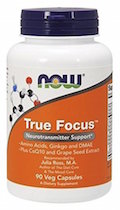 True Focus
True Focus